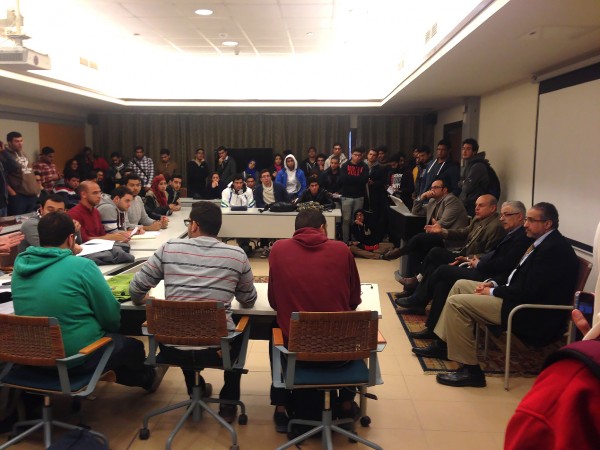Petroleum Engineering Students Save Their Major

BY NADINE SHAWKI
Tarek Shawki, the Dean of the School of Sciences and Engineering (SSE), laid to rest rumors that the Petroleum Engineering Department (PENG) was to be closed, and said instead he would work to strengthen the major.
In an email sent to students February 18, Shawki said: “We are only investing in an energy major in parallel.”
Starting fall 2015, the department will run two parallel majors – the current PENG and the soon-to-be-launched Energy Engineering major.
During a meeting with department students February 15 and 16, Shawki said that the PENG enrollment would no longer be limited and de-emphasized in order to balance between Petroleum Engineering and Energy Engineering.
Provost Mahmoud El-Gamal said that starting next year, the PENG department will have two different tracks: Petroleum Engineering and Energy Engineering, with a first year common to both majors.
Shawki also said that not only will PENG remain functioning, but is expected to hire new faculty.
The issues related to the new major threatened to turn into a crisis for the SSE when students felt they had been side-stepped in the decision- making process from the start.
They had started to petition Shawki and the Provost to hear out their list of grievances.
“We do not receive the quality of education we want.
It is not up to our expectations and there is always a flaw in the decision making process,” Omar Fathy Abd-El Aziz, PENG student senator, told The Caravan.
Students also stressed the department should consider the short and long-term future of the major.
“It is not about us graduating; I know I will graduate. What we are here for is that we, as students, see that the major should continue for years to come,” added Mina Magdy Halim, second PENG senator.
This is not the first clash between PENG students and administration.
One of the contentious issues was the department’s failure in receiving international accreditation by the Accreditation Board for Engineering and Technology (ABET).
“In January 2013, PENG was considered a department with major problems. The university has done enormous efforts to solve these problems,” said Shawki.
But he admits that PENG was simply not ready for accreditation.
“A year ago, PENG students had written a petition to remove the chair and they succeeded. However, that was not our only problem; we did not have enough faculty and those we had were below standard,” says Mostafa Ragab, PENG graduate and current teacher assistant in the department.
He believes that such problems contributed to the accreditation failure.
But Shawki is hoping to rally all the department’s resources to work toward accreditation.
“The meeting clarified the misconceptions caused by an internal mail […] I will send a letter to all PENG students stating what we agreed on, we will establish an internal structure in the department between students and the administration to get accredited,” he said.
We aim at having very constructive student participation, Shawki added.
Provost El-Gamal said each student will decide on one of both paths in their second year, with ABET remaining the top priority for the department.



